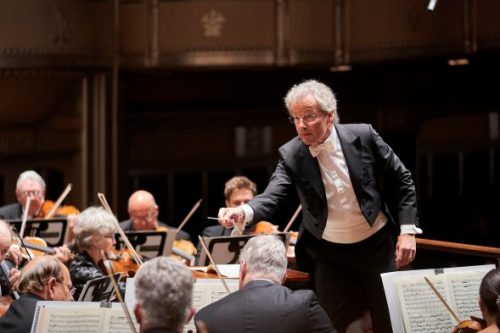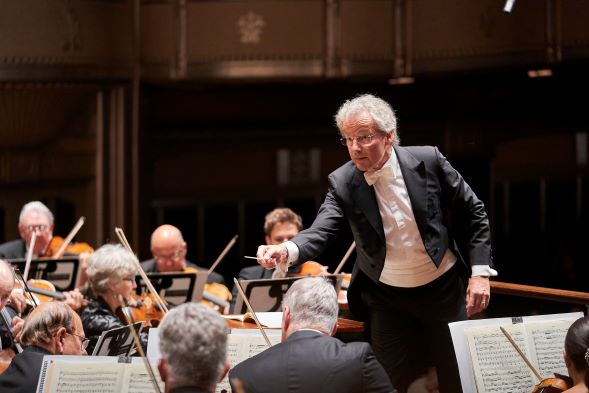 United States Schubert, Prokofiev: Cleveland Orchestra / Franz Welser-Möst (conductor), Severance Hall, Cleveland, Ohio, 19.9.2019. (MSJ)
United States Schubert, Prokofiev: Cleveland Orchestra / Franz Welser-Möst (conductor), Severance Hall, Cleveland, Ohio, 19.9.2019. (MSJ)

Schubert – Symphony No.3 in D major, D. 200
Prokofiev – Romeo and Juliet, Act I
Though it wasn’t billed as such, the Cleveland Orchestra’s 102nd season opener could have been called a ‘FranzFest,’ celebrating the strengths of music director Franz Welser-Möst, who began his eighteenth season at the helm of this great ensemble. Though it hasn’t always been an easy ride, the conductor’s insights have grown steadily over the years, and he and the orchestra are now at the height of their powers. His knack for combining perceptive music-making with intriguing programming has given new life to masterpieces.
In the program notes, Welser-Möst wrote, ‘I have attended performances of Schubert where everything is too fast, where the conductor is pushing too hard, almost like whipping a horse across the finish line.’ His approach to the composer’s Third Symphony demonstrated this subtle distinction: tempos were actually fairly fleet and lithe, yet there was never a brutal drive forcing it onwards. Rather, the score seemed self-propelled, unfolding naturally. Instead of pushing the bar lines, Welser-Möst shaped the addictive melodies in paragraphs. In a classical symphony, the lucidity of this orchestra is simply glorious, and the fact that the Third was featured in Franz’s very first Cleveland concert (in 1993) only added to the sentiment.
The introduction to the first movement was broad without being out of proportion to the frisky Allegro that followed. The slow(ish) second movement— marked Allegretto — was poised and elegant. The ensuing Menuetto was vigorous in the outer sections, slowing down for a deliciously old Viennese-style trio featuring Frank Rosenwein on oboe and John Clouser on bassoon, who made a meltingly charming duet. The finale was light on its feet and joyous. And as part of Welser-Möst’s ongoing exploration of Schubert’s symphonies, it was a treat to have this one return to the orchestra after 20 years.
Recently Welser-Möst has been focusing on Prokofiev, and the first act of Romeo and Juliet showed that the composer especially clicks with the Austrian conductor. In works that do not clearly authorize dramatic interpretation, Welser-Möst is sometimes reluctant to underline expression. But with a demonstrable story, he allows his considerable dramatic powers full rein.
Vivid characterization and trenchant power made it abundantly clear that Prokofiev’s snarling sarcasm is a mask: beneath every cynic lies a wounded idealist. When ‘Romeo and Juliet’s Love Dance’ arrived at the end of the act, there was no attempt to make it sensual or carnal. Instead, it emerged pure and idealized, perfectly suiting these artists’ skill with crystalline neo-classicism.
However, that shouldn’t suggest restraint. At the height of the Montagues’ and Capulets’ feuding, Welser-Möst had the orchestra roar in a (rare) visceral and violent way. In other places, sculpted soft dynamics were breathtaking. One standout moment was ‘The Prince’s Command,’ in which the conductor followed the dissonant brass-and-percussion-drenched climaxes with chillingly vibrato-free string chords. When the cello line arose from those soft chords with a warm vibrato, the effect was startlingly emotional, vulnerable.
‘Juliet as a Young Girl’ was sparkling and light — quick but never rushed, poised but never cold. The ‘Dance of the Knights’ was sweeping and began with a touch of reserve to allow room for intensification. The trio, with sleek viola glissandos, was bewitching. We can only hope that the remainder of the ballet will appear in the future.
Afterward, Welser-Möst pulled another score out from under the Prokofiev, and it was clear an encore was imminent. Otto Nicolai’s overture to The Merry Wives of Windsor made a delightful dessert, returning full circle to the conductor’s Viennese base. The audience cheered the playfulness long and hard.
The new season is off to an auspicious start.
Mark Sebastian Jordan
